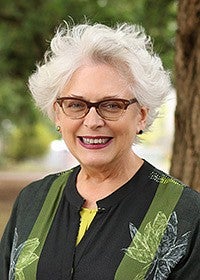
Clark Honors College
lmbishop@uoregon.edu | 541-346-0733
Courses: Lower-division arts and letters, upper division colloquia, occasional graduate classes
In my classes you will:
- Practice foundational, transferrable skills.
- Explore new perspectives.
I was invited into the Teaching Academy because:
- I am an Ersted Award Recipient.
- I am a Herman Award Recipient.
In what ways are you working to make your teaching inclusive?
Guided group work, both in and out of class, takes advantage of inclusive frameworks and practices. Communication requires at least a twosome: having a “real audience” lets students understand the stakes involved in writing and speaking. A classroom practice of students’ taking both tacks – as questioner, as answerer – lets students recognize their stakes in learning. These "meta"-practices are continually examined by the class at large. Inclusivity requires listening on everyone's part. As always, there are no dumb questions. As a medievalist, to me the past means a lot. Learning to care for remote others – remote in time as well as place – broadens students’ horizons and brings them into conversation with the past AND their own situatedness.
What do you do in terms of professional engagement with the teaching and learning culture on campus or nationally?
The Chronicle of Higher Education provides excellent teaching essays and valuable feedback. I’ve published in the journal of Medieval and Renaissance Teaching: there are many such journals for particular interests. I also present my work at conferences concerning curriculum and teaching, most recently at St Xavier's College in Thiruvananthapuram, India, presenting on the "classics" curriculum and the teaching of it.
In what ways was your teaching in this course research-led—informed by research on how students learn and inflected by UO's research mission?
Students use the Knight Library’s Special Collections with guidance; their projects on medievalism require real-world, up-to-the-moment research to find both original documents and secondary research. The library’s staff guide students in hands-on work, both individually and in groups. In addition, the Knight Library provides excellent resources for film studies, and visual media is (a) something I'm learning about and (b) VERY much where our students reside. The goal for all learning is to seek, inform, and articulate.
What made you want to be a teacher?
Over twenty years ago, after the Rodney King verdict, students pointed out that, while Oregon television showed Oregon's black legislators and leaders speaking about the verdict, they lamented that (1) none knew any of these legislators since they’d not been on TV before and (2) only in a crisis were these leaders deemed important enough to show on TV. The work that privileged people like me need to accomplish on a daily basis requires going beyond “ally-ship” and instead to become accomplices in targeted broad efforts to reckon the United States’ and Oregon’s racist histories. Time to change expectations.
